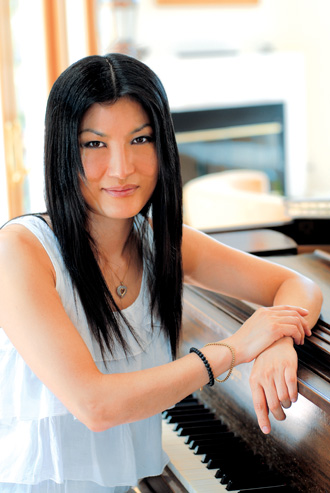By Nina Ahn
Photographs by Eric Sueyoshi
When Sujin Nam was a teenager in Seoul studying classical piano, she stumbled one evening upon a live jazz club in Itaewon, a neighborhood largely catering to the nearby U.S. military base. The pianist, Lee Young Jung, was playing with American jazz musicians.
“I have a very good ear and when I listen to music I know how the harmony goes,” recalls Nam in her soft, carefully enunciated speech. “When I heard jazz for the first time, I was totally thrown off. I couldn’t follow it.”
Nam was intrigued. The eldest daughter in a family full of musicians and music teachers, she had never before been exposed to jazz. When she realized that Lee was improvising she was hooked. Korea’s jazz scene at the time was scant, and Nam could not find formal instruction anywhere. She convinced Lee to give her lessons.
Ultimately, she decided to move to New York from Seoul to attend Mannes College of Music and then later the University of North Texas, where she studied jazz performance, arranging, classical piano performance, conducting and composition. Determined to find a place where she could pursue all her varied musical interests, she left for Hollywood and the University of Southern California’s film music program, where she felt her options would be the most broad.
After graduating, she was taken under the wing of Christopher Young, a USC instructor and Golden Globe-nominated film composer. She has since worked with him many times, starting off as his score coordinator on the Sean Connery film “Entrapment.”
“She’s the hardest working woman I’ve ever met,” says Young about his protégé who won a Sundance composer fellowship in 2002. “And she’s an incredibly talented, brilliant composer.
“Her experience in the world of jazz improvising, gave her a unique take on movies and film scoring.”
The composing business was, however, a competitive scene dominated by white males. Nam often felt the need to omit any soft, love-themed music from her demo tapes, instead packing them with aggressive action or horror-oriented tunes.
“I was thinking,” says Nam, “I have to be totally masculine.”
After attending a 2003 conductor’s workshop led by Lucas Richman, the conductor for the film scores of “The Manchurian Candidate” and “As Good As It Gets,” she and the other five male participants chose a song to conduct. Out of the songs available, she again chose a challenging, action-cue piece from “Chain Reaction” rather than a softer and simpler Mozart number.
Although Richman called her performance “very good,” he was not impressed. “You have to bring out who you are,” he told Nam.
He said any of the other five men in the workshop could have done the “Chain Reaction” piece just as well as she, but only she had the musicality to make the Mozart piece stand out.
“Everyone thought Mozart was too simple, too easy,” says Nam. “I was not thinking [about] the delicate and elegant part of Mozart.
“Now I don’t have fear. I just say, ‘This is me.’”
Recently, the 37-year-old was asked to compose the score for the documentary “Born Dead, Still Weird,” about famed New Yorker cartoonist Gahan Wilson. The documentary, which takes place in Chicago and New York City, calls out for a jazz and blues score.
As a composer, Nam says the goal is to further the director’s vision, to add texture and emotion that will compliment the film. She has so far composed for TV and independent films, as well as the upcoming reality series, “Welcome to the Parkers” on Bravo.
On the blockbuster “Spiderman 3,” Nam served as an orchestrator, working closely with the composer to flesh out rough sketches into detailed orchestration. On other films, she has worked as a score coordinator, assisting the conductor with the sketching of the score and the administrative tasks surrounding the writing and recording of the music. Nam enjoys working in all three veins and says it’s a compliment to have a composer call and ask for her help.
“In time, she’s going to have an outstanding career,” says Young. And despite the lack of women in Hollywood’s ranks of composers, Young insists, “If it’s going to happen to anybody, it should happen to her.”
In addition to her film and television career, Nam writes concert music, performs at jazz clubs and teaches piano. On Sundays, she serves as the pianist for her church.
“I don’t think I could just do one thing,” she continues. “Composition is something that I do in my own studio, all by myself. But [with] performing, I enjoy that musicianship when you’re improvising jazz. You play some lick and the drummer will respond to it and the bass player will inspire me and I will respond to that. That’s a totally different excitement.”
Her schedule is hectic, but she wouldn’t have it any other way. Nam loves that she can indulge all her musical interests without sacrificing any of them.
She’s got nothing to hide.





